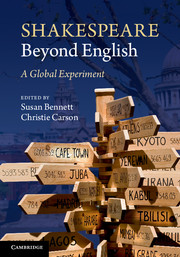Book contents
- Frontmatter
- Contents
- List of Illustrations
- List of colour plates
- Notes on contributors
- Foreword
- Acknowledgements
- Introduction
- The Globe to Globe Festival: An Introduction
- Performance Calendar
- Week One
- Week Two
- Week Three
- Week Four
- Week Five
- Week Six
- Chapter Thirty-Five Habima Merchant of Venice
- Chapter Thirty-Six Patriotism, Presentism and the Spanish Henry VIII
- Chapter Thirty-Seven Touch and Taboo in Roy-e-Sabs’ The Comedy of Errors
- Chapter Thirty-Eight Shakespeare and the Euro-crisis
- Chapter Thirty-Nine Restaging Reception
- Chapter Forty Reviving Hamlet? Nekrošius’ Lithuanian ‘Classic’
- Afterwords
- Index
- Plate section
- References
Chapter Thirty-Five - Habima Merchant of Venice
Performances inside and outside the Globe
Published online by Cambridge University Press: 05 June 2014
- Frontmatter
- Contents
- List of Illustrations
- List of colour plates
- Notes on contributors
- Foreword
- Acknowledgements
- Introduction
- The Globe to Globe Festival: An Introduction
- Performance Calendar
- Week One
- Week Two
- Week Three
- Week Four
- Week Five
- Week Six
- Chapter Thirty-Five Habima Merchant of Venice
- Chapter Thirty-Six Patriotism, Presentism and the Spanish Henry VIII
- Chapter Thirty-Seven Touch and Taboo in Roy-e-Sabs’ The Comedy of Errors
- Chapter Thirty-Eight Shakespeare and the Euro-crisis
- Chapter Thirty-Nine Restaging Reception
- Chapter Forty Reviving Hamlet? Nekrošius’ Lithuanian ‘Classic’
- Afterwords
- Index
- Plate section
- References
Summary
For an American Jewish academic specializing in Shakespeare, hearing that the Habima company chose The Merchant of Venice for its Globe to Globe performance, and that a boycott and protest were planned by pro-Palestinian activists because the company has also performed in the Settlements, created a series of conflicting feelings. The choice of play seemed at once brave, perhaps unwise and finally over-determined; the protest, especially since the Festival advertised a production of Richard II in Palestinian Arabic by the Ramallah-based Ashtar Theatre, similarly over-determined. One wondered what would have happened if Habima had chosen to act, for instance, Troilus and Cressida – would Greeks and Trojans have to be made representatives of the Middle Eastern populations? How would the sides be allotted?
One effect of the anticipated protest was that for this audience member there were, effectively, two performances, one on the stage and the other everywhere else, outside and inside the Globe, with symbolic blocking important in both cases. Outside the Globe on May 28, as we took our place in the queue to go through airport-style security, we passed first the pro-Palestinian protestors and then the Zionist defenders. The pro-Palestinians were kept further away from the entrance, but the queue led directly past the Zionists with their large ‘Israel is God's country’ banner: presumably this was simply a tactical judgement about the possible actions of each group, but it would have been easy to read as a political statement. Inside the theatre, even before the peaceful but conspicuous protests began – the Palestinian flags unfurled from the Globe's galleries had clearly not been found and removed by the searches to which each audience member was subjected on entrance to the theatre – I noticed a burly gentleman standing behind my section, apparently without ticket, seat or overt identification but apparently there in a security capacity and chatting familiarly with the uniformed security guard.
- Type
- Chapter
- Information
- Shakespeare beyond EnglishA Global Experiment, pp. 269 - 272Publisher: Cambridge University PressPrint publication year: 2013

